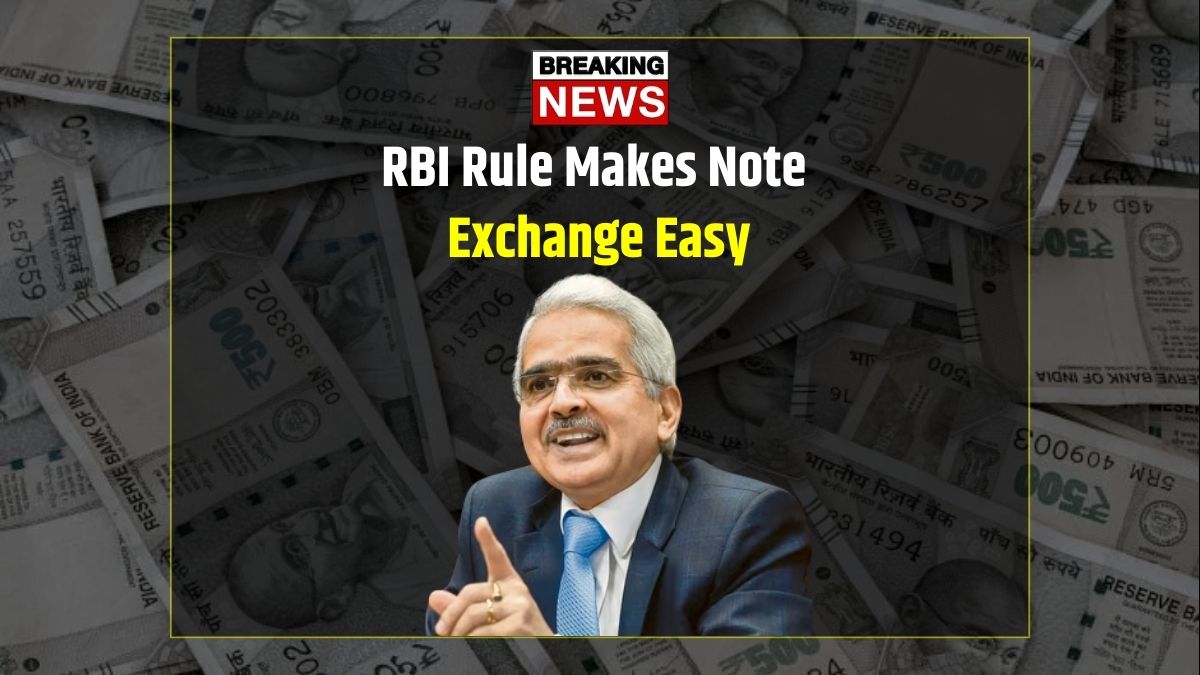RBI New Rule -Got a torn or scribbled note lying around? You’re not alone. We’ve all had that moment when a shopkeeper rejects a slightly damaged note, or you’re unsure if the bank will even take it. Well, here’s some good news: the Reserve Bank of India (RBI) has introduced new and simplified rules for exchanging damaged currency — and they’ve made the process a whole lot easier.
Whether it’s a torn ₹100 note, a scribbled ₹200 note, or a folded ₹500 note — you can now exchange it at your nearest bank with minimal fuss. Let’s break down what’s changed and how it benefits you.
Why Did RBI Change the Rules?
For years, people struggled to exchange damaged notes. Some banks refused to accept them, others asked for weird paperwork or sent people away. This especially affected folks in rural areas and small towns.
To solve the issue, the RBI finally stepped in and created a clear, nationwide rule that all banks now have to follow. It’s aimed at making life easier and the process faster.
What Kinds of Notes Can You Exchange?
You can now walk into a bank and exchange:
- Torn notes
- Notes with missing corners
- Soiled, dirty, or faded notes
- Scribbled notes (as long as they’re still readable)
- Notes damaged by water, fire, or chemicals
- Folded, crumpled, or stuck-together notes
And yes, this rule specifically applies to ₹100, ₹200, and ₹500 notes — the most commonly used denominations.
How Does the New Exchange Process Work?
It’s super simple — no long forms, no approvals, and in most cases, no ID required. Here’s what you need to do:
- Go to any bank branch (not just your own bank — any bank will do).
- Tell the staff you want to exchange damaged notes.
- Hand over the notes — they’ll quickly check if they qualify under RBI’s new criteria.
- If your notes fit the bill, you’ll get the full value back on the spot.
That’s it. No fuss, no forms, and no fees.
What Counts as an “Exchangeable” Note?
The RBI has made things really clear. Here’s how they classify notes now:
| Type of Damage | Will Bank Accept? | Value Returned |
|---|---|---|
| Soiled or worn out | Yes | Full value |
| Slightly torn | Yes | Full value |
| Mutilated (part missing) | Yes | Full or partial value |
| Scribbled but readable | Yes | Full value |
| Burnt or water-damaged | Case-by-case | Partial value |
| Chemically damaged | Case-by-case | Partial value |
| Serial number missing | Yes | Full value |
Which Banks Are Covered?
All of them. Whether it’s SBI, PNB, HDFC, ICICI, Axis, Bank of Baroda, Union Bank, or even smaller cooperative banks — they all have to follow this rule.
Banks must:
- Accept damaged notes from anyone (you don’t need to be a customer)
- Display RBI’s note exchange rules clearly
- Replace eligible notes immediately
- Face action if they refuse to cooperate
Are There Any Limits?
Yes — to avoid bulk misuse, there are some daily exchange limits:
| Denomination | Max Notes/Day | ID Required? |
|---|---|---|
| ₹100 | 50 notes | No |
| ₹200 | 30 notes | No |
| ₹500 | 20 notes | No |
| Mixed notes (under ₹10,000 total) | ✅ | No |
| Over ₹10,000 total | ✅ | Yes |
Business owners can exchange bulk notes too — just keep a record and bring ID.
What If a Bank Refuses to Take Your Notes?
It happens — some bank staff may not be aware of the new rules. Don’t worry. Here’s what you can do:
- Politely show them the RBI’s 2025 circular
- Ask to speak to the branch manager
- If still refused, file a complaint on RBI’s website: cms.rbi.org.in
- Or call RBI’s helpline: 14440
You have the right to exchange your damaged notes — don’t let anyone tell you otherwise.
Why This New Rule Is a Big Deal
This update helps millions of people, especially those who deal in cash daily — small vendors, farmers, homemakers, or anyone who doesn’t use digital payments regularly.
Here’s why it’s awesome:
- No more losing money over torn notes
- Saves time with quick exchanges
- Helps rural communities
- Reduces arguments at shops
- Builds trust in using cash again
Final Thoughts
Thanks to the RBI’s new rule, you no longer have to stress about damaged currency. Just head to your nearest bank and get your notes exchanged without any drama. Whether it’s a torn ₹500 note from your wallet or a scribbled ₹100 from a shop — banks are now required to accept and replace them.
And remember — no ID needed unless you’re exchanging a big amount. So go ahead, check your wallet or cash drawer, and finally get rid of those crumpled notes.






